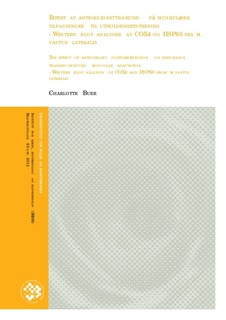| dc.contributor.advisor | Lea, Tor Erling | |
| dc.contributor.advisor | Paulsen, Gøran | |
| dc.contributor.advisor | Raastad, Truls | |
| dc.contributor.author | Buer, Charlotte | |
| dc.date.accessioned | 2012-09-07T12:04:32Z | |
| dc.date.issued | 2012-09-07 | |
| dc.identifier.uri | http://hdl.handle.net/11250/186576 | |
| dc.description.abstract | Bakgrunn: Produsenter av antioksidanttilskudd har lenge hevdet at toppidrettsutøvere bør ta slike tilskudd for å bedre prestasjon, samt å øke helsegevinstene i forbindelse med utholdenhetstrening. De underliggende mekanismene og dokumentasjonene for disse påstandene er imidlertid uklare. Som en følge av utholdenhetstrening øker mitokondriekapasiteten, og dette medfører økt nivå av enzymer som er delaktig i regenerering av energi (ATP) og proteinsyntese. Antioksidanter har i noen studier imidlertid vist seg å hemme treningsindusert oppregulering av mitokondriekapasitet. To viktige enzymer i mitokondriene er HSP60 og COX4.
Formål: Formålet med studien har vært å undersøke om tilskudd av antioksidanter påvirket tilpasningsresponser (nivå av COX4 og HSP60) i muskelen som følge av utholdenhetstrening.
Metode: På forhånd relativt godt trente forsøkspersoner (♀=24, ♂=29) ble randomisert inn i fire grupper, med jevn kjønnsfordeling. Intervensjonsperioden besto av 12 ukers utholdenhetstrening (intervall- og langkjøring, løping) med tilskudd av antioksidanter; C- og E-vitaminer (n=15), Smartfish (n=10), astaxanthin (n=12), og placebo (n=16). Membranfraksjon av vevsprøver fra m. vastus lateralis ble brukt til immunoblot av COX4 og HSP60. For å undersøke effekten av antioksidanttilskudd på aerob kapasitet, ble VO2maks målt.
Statistikk: Det ble utført parete og uparete t-tester, i tillegg til Kruskal-Wallis test og korrelasjonstester (Pearson). Testene ble ansett som signifikant ved en p-verdi ≤ 0,05, og som en tendens ved 0,10 ≥ p > 0,05. Beregninger ble utført i Excel og Prism5.
Resultater: I løpet av treningsperioden med antioksidanttilskudd økte proteinnivå av COX4 i placebogruppen (61 %), men ble redusert i gruppen med C- og E-vitamintilskudd (-19 %). Det var en tendens til økning (gjennomsnittlig på 6 %) i nivå av HSP60 når alle gruppene var samlet. Det var ingen andre signifikante endringer for COX4 og HSP60. Trening økte også VO2maks i alle gruppene (gjennomsnittlig økning på 6,8 %), men det var ingen forskjeller mellom placebogruppen og gruppene med antioksidanttilskudd.
Konklusjon: Utholdenhetstrening økte som forventet proteinnivå av COX4, men tilskudd av C- og E-vitaminer syntes å hemme denne oppreguleringen. Det
så ikke ut til at utholdenhetstreningen, med eller uten antioksidanttilskudd, hadde stor påvirkning på nivåene av HSP60. Utholdenhetstrening ga en forventet økning i VO2maks, men antioksidanttilskuddene påvirket ikke denne økningen. | no_NO |
| dc.description.abstract | Background: Manufacturers of antioxidant supplements have long argued that athletes should take antioxidant supplements to improve performance and to provide health benefits. The underlying mechanisms and documentations of these claims is however unclear. Endurance training increases mitochondrial capacity, and this leads to increased levels of enzymes that are involved in the regeneration of energy (ATP) and protein synthesis. Antioxidants have in some studies been shown to inhibit the exercise-induced up regulation of mitochondrial capacity. Two important enzymes in mitochondria are HSP60 and COX4.
Objective: The aim of this study was to investigate whether supplementation of antioxidants influence exercise-induced adaptation in muscles after a period of endurance training.
Method: Relatively well-trained subjects (♀=24, ♂=29) were randomized into 4 groups with an equal distribution of gender. The intervention period included 12 weeks of endurance training (interval and long distance running) with supplements of; C- and E-vitamins (n=15), Smartfish (n=10), astaxanthin (n=12), or placebo (n=16). The membrane fraction of tissue samples from M. vastus lateralis were used for immunoblot analysis with antibodies for COX4 and HSP60. VO2max was measured to investigate the effects of antioxidant supplementation on aerobic power.
Statistics: There were performed paired and unpaired t-tests, in addition to Kruskal-Wallis test and correlation tests (Pearson). The tests were considered significant at a p-value < 0.05, and as a tendency at 0.10 > p > 0.05. Calculations were performed in Excel and Prism5.
Results: The endurance training program and the antioxidant supplements led to an increased protein content of COX4 in the placebo group (61 %), but a reduced content in the group with supplementation of C- and E-vitamins (-19 %). There was a tendency of an increased amount of HSP60 (average of 6 %) when the groups were collapsed, regardless of antioxidant supplements. Training increased VO2max in all groups (6.8 %), with no differences between the placebo group and the groups with antioxidant supplements.
Conclusion: As expected, endurance training increased the protein level of COX4, but supplements of C- and E-vitamins appeared to inhibit this up regulation. It did not seem that endurance training, with or without supplements of antioxidants influenced the levels of HSP60. Endurance training resulted in an expected increase in VO2max, and the antioxidant supplements did not affect this increase. | |
| dc.language.iso | nob | no_NO |
| dc.publisher | Norwegian University of Life Sciences, Ås | |
| dc.subject | Idrettsutøvere | no_NO |
| dc.subject | Antioksidanttilskudd | no_NO |
| dc.title | Effekt av antioksidanttilskudd på muskulære tilpasninger til utholdenhetstrening : Western blot analyser av COX4 og HSP60 fra m.vastus lateralis | no_NO |
| dc.title.alternative | The effect of antioxidant supplementation on endurance training-induced muscular adaptation : western blot analysis of COX4 and HSP60 from m.vastus lateralis | no_NO |
| dc.type | Master thesis | no_NO |
| dc.subject.nsi | VDP::Medical disciplines: 700::Sports medicine: 850 | no_NO |
| dc.description.embargo | 2017-05-15 | |
| dc.source.pagenumber | 70 | no_NO |
| dc.description.localcode | M-LUN | |
